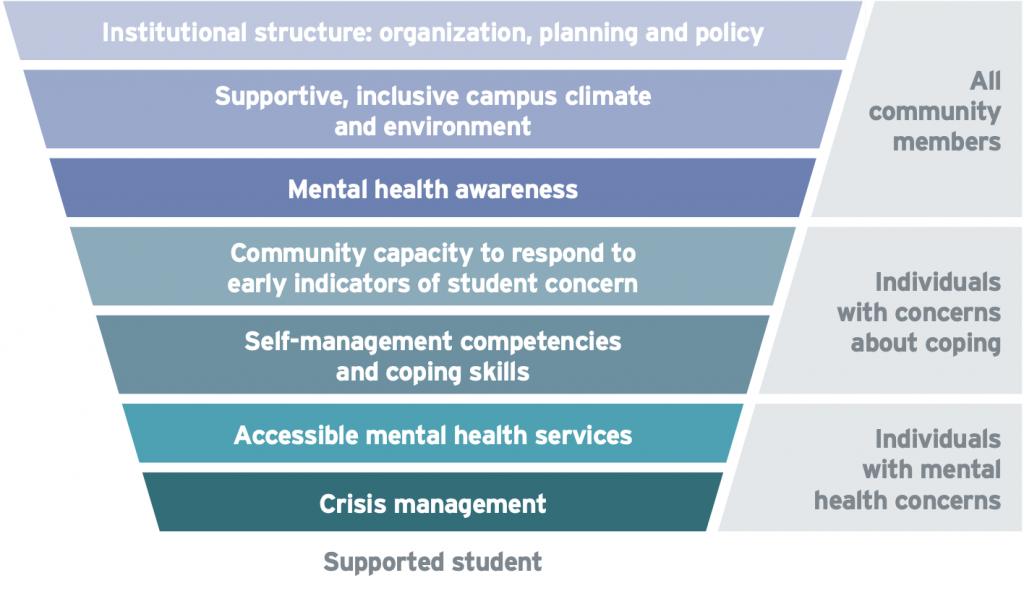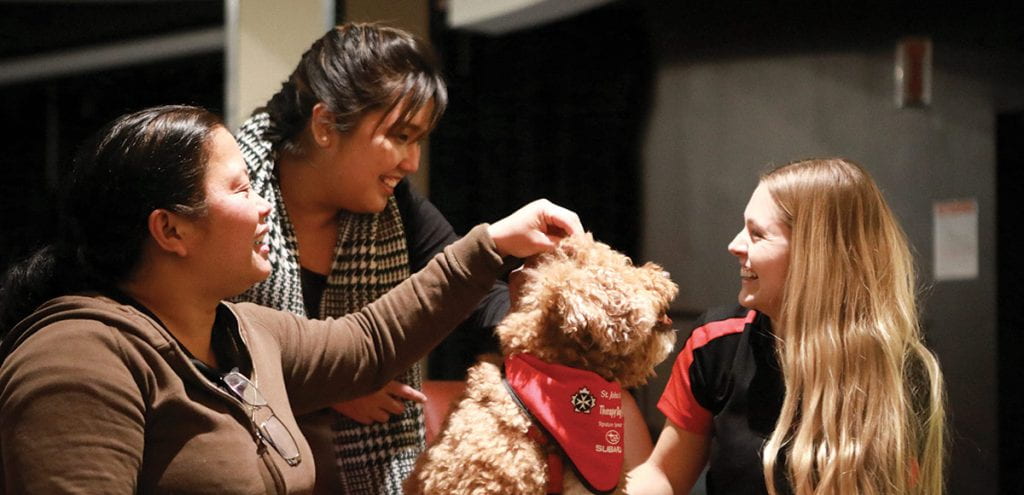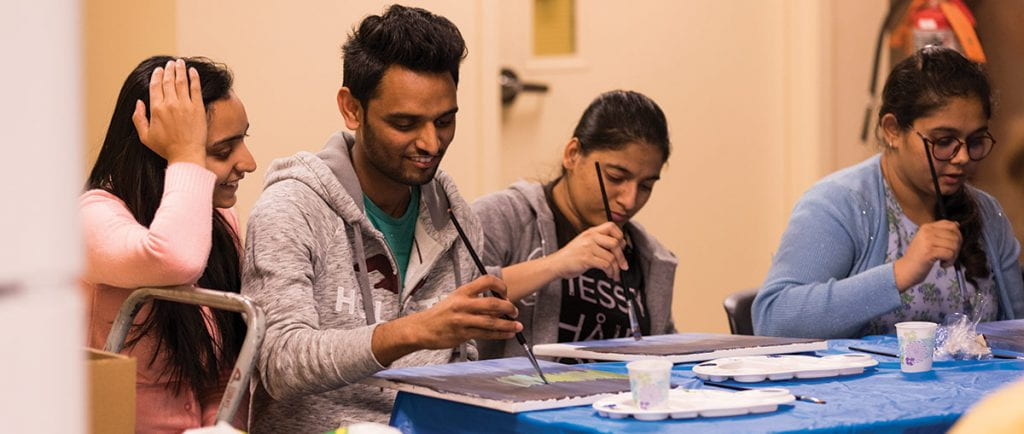


The goal of the Healthy Minds Healthy College Strategy is to cultivate an environment of support that provides a sense of well-being, belonging, connectedness and positive mental health for all students, faculty and staff to support academic and career success. Since the initiative launched in 2014, substantial work has been done. This document recognizes the strengths that are currently in place, while providing a path forward to guide the work that remains.
Fostering the development of positive mental health by supporting individual resilience, creating supportive environments and addressing the influence of the broader determinants of mental health are key components of promoting mental health.1 That is why our strategy focuses not only on building individual coping skills and encouraging help-seeking behaviour but takes a systemic approach, aiming to create interpersonal and organizational conditions that foster positive mental health. This comprehensive strategy intends to support every member of the College community at multiple levels and in ways that respect all forms of diversity. It is our way forward.

As an added challenge, this must be done within a context where the COVID-19 pandemic has changed the way we all learn and work. Although at first glance, it may be tempting to put mental health promotion work on hold while we await a return to usual operations, a closer look would find this unwise. COVID-19 has created rapid and unavoidable change, stress, isolation and economic disruption, which are all psychological health and safety hazards. Further, there are warnings of an “echo pandemic” of poor mental health. Thus, it is even more important that the work of creating a healthy community, conducive to positive well-being, continues.
In this new reality, the number of students and staff with “concerns about coping” (see Figure 1) is likely to increase. It’s imperative, therefore, that we use evidence-based strategies to respond to early indicators of concern and help all develop self- management competencies and coping skills.
The Roadmap does not replace previous documents (e.g., HMHC Charter), but complements and extends these while serving as a strategic guide, assisting in decision making and resource allocation.

This document outlines current campus initiatives and target areas. The current campus initiatives are an inventory of the strengths, programs and resources already in place. Target areas are opportunities for improvement. Current campus initiatives and target areas highlighted do not belong to one College department or division as we recognize that becoming a health-promoting institution requires organization-wide collaboration. The Healthy Minds Healthy College Steering Committee, however, serves as a catalyst for moving the work forward in alignment with the College’s strategic plan.
Our Senior Leadership Team endorses the actions outlined in this Roadmap as critical to advancing our mental health strategy toward the ultimate goal of being a health-promoting institution. Within a context of finite resources, endorsement of this Roadmap does not automatically ensure all resource requests will be approved, however such requests will be considered through the lens of the Roadmap. While the actions will require commitment, collaboration and investment, they will result in an engaged, vibrant workforce and student body.
1 Canadian Institute for Health Information
We are grateful to the many individuals, committees and organizations that have advanced knowledge related to workplace and campus mental health. Our Roadmap is informed by the documents listed below.

This section presents a scan of our current campus initiatives along with target actions within each of the seven key levels.

After consultation with internal and external stakeholders, we have determined the following to be the initial priorities.
| Target | Sponsor | Implemented By | COVID-19 Considerations |
|---|---|---|---|
| Seek senior leadership endorsement of 2021-25 Roadmap. | N/A | HMHC Steering Committee | Completed |
| Implement the National Standard for Psychological Health and Safety in the Workplace, including a statement of commitment and policy. | Chief Human Resource Officer | Director, Safety and Health Services Mental Health Coordinator | Increased importance |
| Develop statement for course outline template, highlighting the impact of mental health on academic success and directing to supports. | Executive Director, Academic | Mental Health Coordinator | Completed |
| Target | Sponsor | Implemented By | COVID-19 Considerations |
|---|---|---|---|
| Identify additional spaces for students and staff to rest and refresh during the work day and/or enhance current spaces. | Chief Human Resource Officer Executive Director, RRC Polytech Students’ Association | TBD | In the current context, ensuring adequate socially distanced study space takes priority. |
| Conduct applied research and evaluation aimed at improving student well-being and retention. | Executive Director, Strategy and Communications | Institutional Analysis and Planning Mental Health Coordinator | Increased importance |
| Target | Sponsor | Implemented By | COVID-19 Considerations |
|---|---|---|---|
| Ensure a mental health information and resources area is present at each campus. This should include relevant pamphlets, posters, toolkits, etc. | Executive Director, RRC Polytech Students’ Association | Mental Health Coordinator | Instead of on-campus physical spaces, information and resources should be distributed electronically, using a variety of mediums. |
| Target | Sponsor | Implemented By | COVID-19 Considerations |
|---|---|---|---|
| Redesign Behavioural Intervention Team with a proactive approach to preventing adverse incidents. | Chief Human Resource Officer Executive Director, Community and Student Services | Director, Safety and Health Services Manager, Counselling and Accessibility Services | Redesign must consider processes needed during remote delivery. |
| Develop an “Early Assist” program or case management model to provide outreach and support service coordination to at-risk students. | Executive Director, Community and Student Services | Manager, Counselling and Accessibility Services | Development must consider processes and strategies during remote delivery. |
| Explore offering e-mental health services to students and options for resourcing. | Executive Director, Community and Student Services | Mental Health Coordinator | Completed |
| Target | Sponsor | Implemented By | COVID-19 Considerations |
|---|---|---|---|
| Drive utilization of online mindfulness training, particularly by supporting instructors to integrate with curriculum. | Executive Director, Academic | Mental Health Coordinator | Increased importance |
| Target | Sponsor | Implemented By | COVID-19 Considerations |
|---|---|---|---|
| Assess Counselling and Accessibility Services model. Consider revising to include drop-in counselling and internship program. | Executive Director Community and Student Services | Manager, Counselling and Accessibility Services | |
| Work with International Education to reduce international student barriers to mental health services. | Executive Director, Community and Student Services | Manager, Counselling and Accessibility Services Director, Centre for International Education and Global Partnerships | |
| Ensure adequate Counselling and Accessibility Services staffing in order to reduce wait times. | Executive Director, Community and Student Services | Manager, Counselling and Accessibility Services |
| Target | Sponsor | Implemented By | COVID-19 Considerations |
|---|---|---|---|
| Create a Critical Incident Stress Management response team to support staff. | Chief Human Resource Officer | TBD | Increased importance |
The report was prepared by the Healthy Minds Healthy College Steering Committee.
Additional guidance was provided by the Healthy Minds Healthy College Advisory Group, which is comprised of staff, students and faculty who care deeply about mental health.
We thank our Senior Leadership Sponsors Aileen Nadjuch (Executive Director, Community and Student Services) and Melanie Gudmundson (Chief Human Resource Officer).
RRC Polytech campuses are located on the lands of the Anishinaabeg, Ininiwak, Anishininwak, Dakota Oyate, and Denésuline, and the National Homeland of the Red River Métis.
We recognize and honour Treaty 3 Territory Shoal Lake 40 First Nation, the source of Winnipeg’s clean drinking water. In addition, we acknowledge Treaty Territories which provide us with access to electricity we use in both our personal and professional lives.